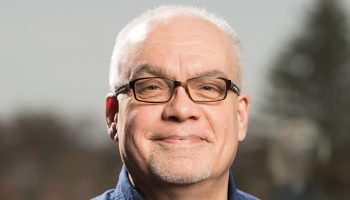SARAH VEST – STAFF WRITER

How a poet completes the act of language- and image-making is always linked to the historical, cultural and indigenously determined ways in which they see the world. That’s the way Luisa A. Igloria, Poet Laureate of Virginia, prefers to think about how she crafts her poems.
Igloria, poet-in-residence for Week Three at the Chautauqua Writers’ Center, will deliver a Brown Bag lecture titled “Bodies, Histories and the Architectures of Poem-making” at 12:15 p.m. EDT Tuesday, July 13 on the CHQ Assembly Virtual Porch. She’s also spending the week teaching a workshop through the CHQ Assembly Online Classroom, titled “Writing at the Edge of the Irreversible.”
She is the author of Maps for Migrants and Ghosts, The Buddha Wonders if She is Having a Mid-Life Crisis and 12 other books. Igloria was the inaugural recipient of the 2015 Resurgence Poetry Prize for ecopoetry and is a Louis I. Jaffe Professor and University Professor of English and Creative Writing in the master of fine arts program at Old Dominion University. She leads workshops for The Muse Writers Center in Norfolk.
Igloria is an immigrant and spent most of her formative years in Baguio City in the Philippines before she emigrated to the United States to get her doctorate in Chicago as a Fulbright Scholar. She grew up speaking not one, but three languages: Ilocano, Tagalog and English.
Growing up in Baguio, Igloria said, it was very clear who was a native and who had just spent a lot of time there. It was also clear that the history of the city is connected to the history of U.S. and Philippine relations.
It’s impossible to separate language and the body from its universe or the histories of its encounters, which all kind of trickled down into the poem’s body. For me, the poem is not just a linguistic artifact; it’s not just a thing made of words.”
– Luisa A. Igloria
Poet-in-residence,
Chautauqua Writers’ Center
This environment has had a profound effect on her poetry. She writes primarily in English for the American publishing world, but doesn’t shy away from including words and concepts from her other languages.
“Why do I have to signal (these words’) foreignness or their difference, when they feel organic to my use and to my conceptual awareness?” Igloria said.
With this, Igloria wants to dispel the idea of the universal reader that has been taken up by contemporary writers. She thinks that relatability shouldn’t be a primary consideration of writers — and it can keep them from telling the stories they are meant to.
“Even if I can’t relate to (a work) that doesn’t mean that there is no importance for me, or that it has no potential importance to others,” Igloria said. “So even if you are not Filipino, it doesn’t mean that I won’t be able to get across to you.”
Language is not the only thing she features in her writing. She is also interested in exploring the historical connection of bodies with location and how that can influence a poem’s direction.
“It’s impossible to separate language and the body from its universe or the histories of its encounters, which all kind of trickled down into the poem’s body,” Igloria said. “For me, the poem is not just a linguistic artifact; it’s not just a thing made of words.”



